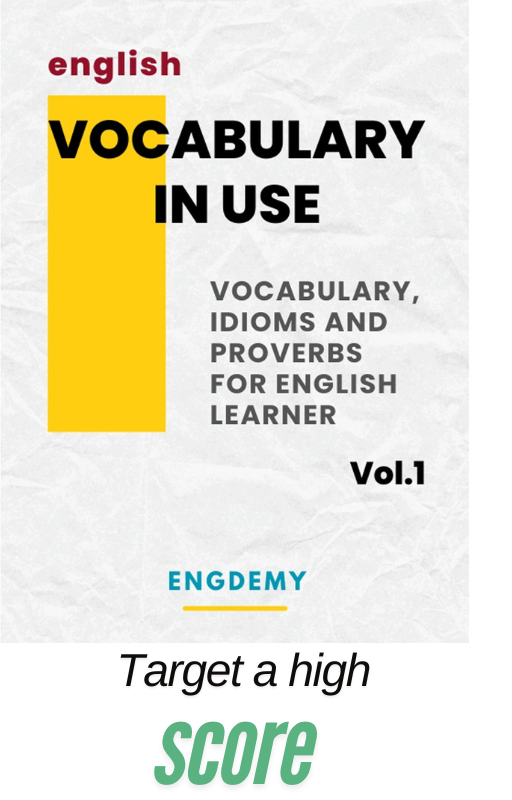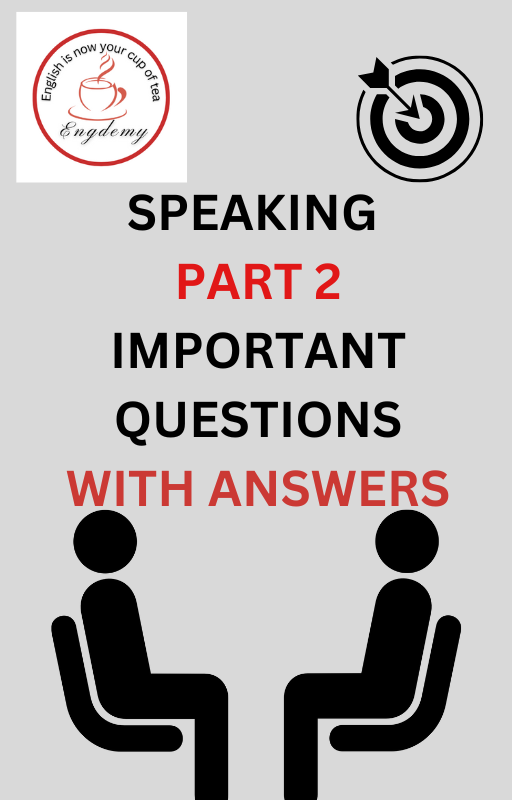SPEAKING PART 1
SECTION 1
The first section of the Speaking test focuses on understanding the candidate’s personal life and background. The questions in this segment are designed to explore topics such as:
- Professional Experience: Insights into the candidate’s current role, career journey, and key accomplishments at work.
- Family Background: General questions about family dynamics and support systems.
- Home Life: Daily routines, personal responsibilities, and how the candidate balances work and life commitments.
- Hobbies and Interests: A glimpse into the candidate’s passions, recreational activities, and how they spend their leisure time.


SECTION 2
This section of the IELTS Speaking Test requires candidates to deliver a monologue based on a given topic. The examiner provides a task card that outlines the subject of discussion, along with a set of guiding questions to help the candidate structure their response. The candidate is then given one minute to organize their thoughts before presenting a coherent and detailed monologue lasting between one to two minutes.
The primary aim of this exercise is to evaluate the candidate’s ability to communicate effectively, demonstrating their proficiency in organizing ideas, articulating them with clarity, and expressing their opinions fluently on the topic at hand. During the preparation time, candidates are encouraged to jot down key points or ideas they want to address, ensuring they cover all aspects of the task card. The ability to formulate a response that is not only structured but also engaging and informative is essential for achieving a high score.
In addition to fluency and coherence, the monologue also assesses the candidate’s lexical resource (range of vocabulary) and grammatical range and accuracy. Candidates are expected to use advanced vocabulary and complex sentence structures to convey their ideas effectively. Furthermore, demonstrating the ability to speak with confidence and express nuanced thoughts on a variety of topics is crucial for success in this section of the exam.
SECTION 3
In this section, the examiner will ask a series of follow-up questions that are closely related to the topic discussed in Section 2. These questions are designed to be more demanding and require the candidate to engage in critical thinking and analysis. Rather than simply providing straightforward responses, candidates are expected to reflect on the subject more deeply, explore various perspectives, and present well-reasoned arguments.
The examiner may ask questions that prompt candidates to elaborate on their opinions, consider the broader implications of the topic, or examine potential consequences. For instance, they might inquire about how certain trends or issues could evolve in the future, or they may ask for a comparison between different viewpoints on the matter. These questions are intended to assess the candidate’s ability to reason logically, make connections between ideas, and express their thoughts in a clear and cohesive manner.
This part of the test is crucial in evaluating the candidate’s capacity to demonstrate higher-level cognitive skills, such as problem-solving, reasoning, and the ability to defend or challenge viewpoints effectively. The candidate is expected to answer with thoughtful, insightful responses, using sophisticated vocabulary and complex sentence structures to convey their ideas with clarity and precision.
PART 2
It is a monologue (1 person speaking) by the candidate
The examiner will give a card to the candidate with a topics and some guiding questions in it.
Student will have 1 minute to prepare and has to speak for 1 to 2 minutes on this subject.
Section 3
Here the examiner will ask some more questions generally related to the subject spoken about in section 2.
These questions will be more demanding and require some critical analysis on the part of the candidate.
There are some commonly made mistakes by the candidates during the speaking test if these are rectified you can score an exceptional band score in IELTS speaking.
- Don’t be too brief
Our goal here is not to just answer the questions, rather be thoughtful in your responses. It might be an honest and correct answer but until it is a flat and brief response it would not allow the examiner to assess our language skill. Try to extend your answers with not more than one or two lines.
- Do not memorise the answer
Examiners are able to determine whether you speak freely or you memorized the answer and it is highly likely that you might forget what you have memorised or which will eventually lead you to take long pauses to recall what was memorised and this will break the actual flow of the conversation. Focusing more on expressing yourself rather that mugging up answers will increase your band score.
- Avoid using irrelevant memorised words
We have a notion in our mind that speaking big fancy words will increase our band, which is true so we end up learning words to impress the examiner and try to fit them in the conversation even when they don’t even make any sense. Use your lexical resources in a right way.
- Avoid using fillers
We often use fillers to buy time to think of sentences to speak.
Instead of using obvious fillers like “basically, you know, actually, that’s it, ehh, ahh, yeah well”
You can use sentences like- “I suppose, I think, I reckon that, in my opinion, according to my observation, one of the things that come to my mind is”
Also there are various alternative words to use to avoid loop of same word again and again, such as the word “very”.
There are multiple alternate words to replace the word very when added to any adjective.
- Keep a check on intonation
The rise and fall of the voice while speaking is important is you speak in monotone or in a flat voice without any variations it is difficult for the examiner to focus on what part of the speech is important. Using of hand gestures also adds to the rhythm of the conversation.
- Enhance your grammatical range
The IELTS examiner who assess your language skills mark you on the basis of these criteria:
- Fluency and coherence
Fluency in language and clarity in your voice is an important part.
- Lexical resource
Use of good vocabulary, proverbs and idioms
Grammatical range and accuracy your selection of words matters a lot, repeating the same word again and again might lose its value hence you should have a diverse range of words.
- Pronunciation
This is the tricky part, some of us try to speak in accent. It is not important for you to speak in an American accent, instead your pronunciation in your own language should be correct. Candidate often get confused between sounds like sh and ss.
- Grammar
Always use the correct verb tenses when answering the question. For instance, if you are asked ‘What kind of music do you like?’ (Present tense), do not answer in past tense.
- No negative answers
There might be instances where you do not have any answer to examiner’s question or you simply have not heard or done that before, here the trick is to reply with an affirmative attitude. You may use sentences like-
I haven’t heard that before but I would like to give it a shot…
Oh that’s a tricky one.. In my opinion..
Never answer in a negative tone, even if you have no response try to create one! There are no right or wrong answers examiner might not even care if you say, “I prefer to live underwater if given a chance”. Just express yourself!
8. Speak a little English every day!
Try to speak a few sentences on every day basis learn new words and use them in your conversation this will help you speak fluently and naturally on exam day.
9. Do not repeat a question.
Avoid repetition of examiner’s question as a part of your answer. Understand the question and rephrase it in your own language.
10. Practise common ielts speaking topics
Do not give the speaking exam without doing a few mock sessions, try to record yourself while speaking and play to find where you need to work. You can practise on some common topics like:
· Sport and recreation
· Crime and punishment
· The internet
· Advertising and retail
· Entertainment
· Education
